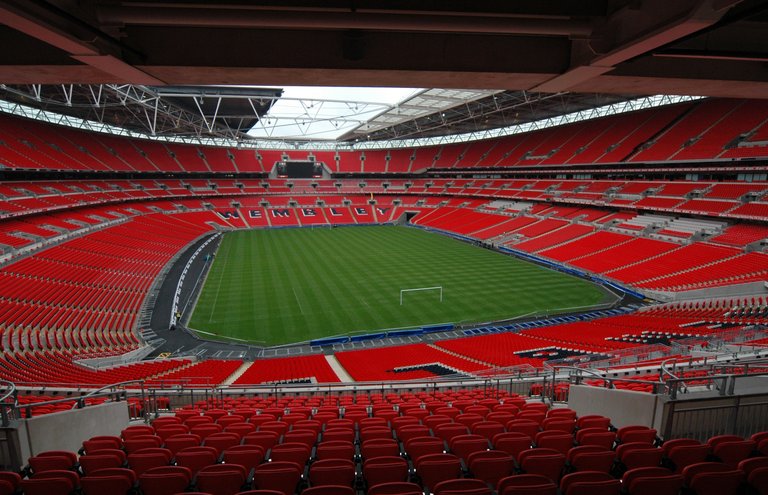LeoGlossary: Stadium

The word "stadium" refers to a large outdoor venue used for sports events, concerts, and other performances. It typically features tiered seating surrounding a central field or track.
The origin of the word "stadium" can be traced back to ancient Greece. The Greek word "stadion" originally referred to a length of about 600 feet, which was the standard length of a running track used in the ancient Greek Olympics. The Romans later adopted the term "stadium" to describe similar venues with a central track and surrounding seating.
In modern usage, a stadium is a large, enclosed sports arena that can accommodate thousands of spectators. Stadiums are commonly used for events like football, soccer, baseball, and concerts. They often feature amenities like concession stands, locker rooms, and luxury suites.
The word "stadium" can also refer to a stage or phase in a process or development, such as the different stages of an insect's life cycle. This usage comes from the ancient Greek and Roman meaning of the word as a standard unit of length or distance.
Stadium versus Arena
A stadium and an arena are both large venues used for hosting events, but they have some key differences.
A stadium is an outdoor venue that is typically used for sports events, such as football, soccer, baseball, and track and field. Stadiums are designed with a large central field or track, surrounded by seating for spectators. They are usually open-air structures, although some may have a retractable roof.
An arena, on the other hand, is a smaller, enclosed venue that is used for a variety of events, including sports, concerts, and conventions. Arenas are typically used for indoor sports, such as basketball, hockey, and ice skating. They have a central floor or stage, surrounded by seating for spectators. Arenas may also have additional features, such as luxury suites, restaurants, and retail spaces.
The main difference between a stadium and an arena is the type of events they are used for and the design of the venue. While both are used for large-scale events, they serve different purposes and have different layouts.
Famous Stadiums
Here are some of the most famous stadiums in the world:
- Wembley Stadium in London, England - This is the home of English football and has a capacity of 90,000. It has hosted numerous major football matches, including the FA Cup Final and the UEFA Champions League Final.
- Camp Nou in Barcelona, Spain - This is the home of FC Barcelona and has a capacity of 99,354. It is the largest stadium in Europe and has hosted numerous Champions League finals and international matches.
- The Rose Bowl in Pasadena, California, USA - This stadium has a capacity of 92,542 and has hosted five Super Bowls, the 1994 FIFA World Cup Final, and the 1999 FIFA Women's World Cup Final.
- The Melbourne Cricket Ground (MCG) in Melbourne, Australia - This stadium has a capacity of 100,024 and is the largest stadium in the Southern Hemisphere. It is the home of Australian rules football and has hosted numerous cricket matches, including the 1992 Cricket World Cup Final.
- The Maracanã in Rio de Janeiro, Brazil - This stadium has a capacity of 78,838 and has hosted numerous major football matches, including the 1950 and 2014 FIFA World Cup Finals.
- The Bird's Nest in Beijing, China - This stadium has a capacity of 91,000 and was the main venue for the 2008 Summer Olympics and Paralympics.
- The Allianz Arena in Munich, Germany - This stadium has a capacity of 75,000 and is the home of Bayern Munich. It is known for its unique exterior design, which features inflatable panels that can change color.
- The Staples Center in Los Angeles, California, USA - This stadium has a capacity of 20,000 and is the home of the Los Angeles Lakers, Los Angeles Clippers, and Los Angeles Kings. It has hosted numerous major sporting events, including the NBA All-Star Game and the Grammy Awards.
- The Yankee Stadium in New York City, New York, USA - This stadium has a capacity of 54,251 and is the home of the New York Yankees. It has hosted numerous major baseball events, including the World Series and the All-Star Game.
- The Santiago Bernabéu in Madrid, Spain - This stadium has a capacity of 81,044 and is the home of Real Madrid. It has hosted numerous major football matches, including the UEFA Champions League Final.
Events at Stadiums
Stadiums are used for a variety of events, including:
- Sports events: Stadiums are primarily used for hosting sports events, such as football, soccer, baseball, rugby, and track and field. They are designed to accommodate large crowds and provide a central field or track for athletes to compete on.
- Concerts: Stadiums are also used as venues for concerts and music festivals. They can accommodate large crowds and provide a spacious stage for performers.
- Cultural events: Stadiums may also be used for cultural events, such as religious gatherings, festivals, and ceremonies. They can provide a large, open space for people to gather and participate in cultural activities.
- Community events: Stadiums may also be used for community events, such as charity runs, walkathons, and other fundraising events.
- Corporate events: Stadiums can be used for corporate events, such as product launches, conferences, and meetings. They can provide a unique and memorable venue for businesses to showcase their products and services.
General:
Posted Using InLeo Alpha